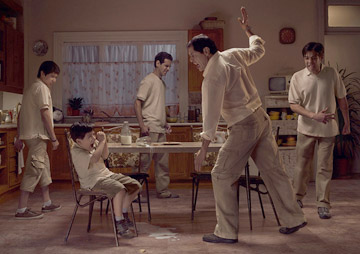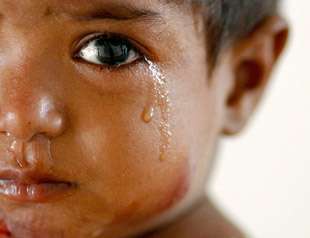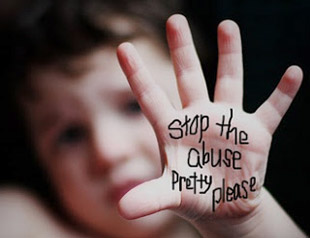'National policy for child protection essential to curb abuse'
By Kurulu Kariyakarawana
Today is Children's Day. Although various countries recognise it on
various dates through out the calendar year, the largest group of
countries, 49 countries observe Children's Day on June 01. In Sri Lanka
we mark World Children's Day on October 01. Universal Children's Day
proclaimed by the United Nations is commemorated on November 20 observed
by ten countries together.
 |
|
A little boy being
unrelentlessly caned |
|

The tears tell it all! |
On all these days including today children around the world are
remembered, celebrated and numerous programs conducted to initiate,
uplift and adopt action to benefit and promote the welfare of children.
To bring awareness to children around the globe who have succumbed to
violence due to abuse, exploitation and discrimination. Children are
used as labourers in some countries, in armed conflict, living on the
streets, suffering due to differences be it religion, minority issues or
disabilities.
But it is questionable how sufficient it is to talk about children
and their welfare only on these dates and as children fall into a
category that should be given constant attention to their development
and well being. It is sad to bring to the notice of the readers that
even at this moment, a child is being abused in some part of the
country. The most recent incident reported two days ago where according
to media reports a 14-year-old boy has allegedly been molested by a
soldier at a cadeting camp. The National Cadet Corps in charge of the
training camp immediately arrested the soldier following a complaint
lodged by the National Child Protection Authority (NCPA). The case is
being investigated by the NCPA at present and the soldier is to face
legal action.
The NCPA is the sole body that is legally empowered to protect
children from abuse in Sri Lanka under the NCPA Act No. 50 of 1998. The
Act has also vested powers to the authority to create a National Child
Protection Policy to stop and curb child abuse, to safeguard children
who are victims of abuse as well as to treat them medically and
psychologically. Although a national authority was set up 16 years ago,
a national policy is yet to be passed through Parliament where
preparatory work is being carried out at present. A fully designed draft
of the National Child Protection Policy was officially presented to the
country's first lady Mrs. Shiranthi Rajapaksa on October 01, 2013 on
World Children's Day.
The draft is currently open for public opinion and views which will
be amended accordingly and presented to Parliament to get the approval
before the end of this year. With the guiding principle of "Giving our
children a childhood that they can be proud of". The draft of the
national policy is created on four guiding beliefs of recognition of
children's best interests, protection against any form of harm,
exploitation or abuse, coordinated response to protection and early
intervention and prevention.
 So what does child protection really mean. According to Article 1 of
the UN Convention on the Rights of the Child (UNCRC) in 1989, "every
person below the age of 18 is defined as a child". Child protection is
identified as the prevention of and response to abuse, neglect,
exploitation and violence against children. So what does child protection really mean. According to Article 1 of
the UN Convention on the Rights of the Child (UNCRC) in 1989, "every
person below the age of 18 is defined as a child". Child protection is
identified as the prevention of and response to abuse, neglect,
exploitation and violence against children.
All children have the right to protection and they have the right to
be physically and emotionally safe and protected at all times. The
family is the natural origin of protection for building a safe and
loving homely environment for children. The responsibility thereafter,
for building a safe environment outside the home lies with the schools
and the community. Children should be protected in the family, school
and community so that they can survive, grow, learn and develop to their
potential. But the problem starts when this fundamental natural safe
environments are breached for various reasons and children become
victims within their own trusted environments.
Child abuse comes in four different forms such as physical abuse,
sexual abuse, psychological or emotional abuse and neglect. Physical
abuse involves physical aggression, directed at a child by an adult
where harm is caused to the child's health, existence, development and
dignity. These forms of abuse include assault such as hitting, kicking,
violent shaking, biting, burning, strangulation and poisoning. Secondly
sexual abuse is considered as using a child for sexual purposes by an
adult or an adolescent without his or her acceptance.
Forms of child sexual abuse include asking or pressuring a child to
engage in sexual activities, exposing genitals indecently to a child,
displaying pornography, contacting sexually with a child, contacting
physically with the child's genitals, viewing of the child's genitalia
without physical contact or using a child to produce child pornography.
Having negative concepts about children, harassing children verbally
and non-verbally can be defined as emotional and psychological abuse.
Incapability of providing love and affection that a child hopes in their
childhood is also considered as emotional abuse where children feel
unsafe about themselves which will lead them to an unhappy life.
Neglecting is also considered a serious type of abuse.
Child neglect is the failure of a parent or other person with
responsibility for the child to provide needed food, clothing, shelter,
education, medical care or supervision to the degree that the child's
health, safety and well being are threatened. Neglect is also a lack of
attention from the people surrounding a child and the non provision of
relevant and adequate necessities for the child's survival, which would
be a lack of attention, love and nurturing the child in a conducive
environment.
As the sole body empowered by an Act of parliament to look into
child- related issues the NCPA is responsible to maintain a series of
activities referred to in the Act.
The functions of the authority are to advise the government in the
formulation of a national policy on the prevention of child abuse and
the protection and treatment of children who are victims of such abuse,
to advise the government on measures for the prevention of child abuse,
to advise the government on measures for the protection of the victims
of such abuse, to create an awareness of the right of a child to be
protected from abuse and the methods of preventing child abuse, to
recommend legal, administrative or other reforms required for the
effective implementation of the national policy for the prevention of
child abuse, to monitor the implementation of laws relating to all forms
child abuse, to monitor the progress of all investigations and criminal
proceedings relating to child abuse, to prepare a national database on
child abuse. One of the effective services launched by the Authority is
to set up a telephone hotline to receive complaints of all types of
child abuse. Named as 1929 Child Line which was introduced in 2010, the
hotline enables anybody to call up and inform of any unlawful act being
committed towards a child.
The launching of this line was a great success as the authority had
started getting numerous complaints related to abuse since 2010 and all
those complaints were recorded, monitored and carefully investigated
prior to seeking remedial measures.
Explaining the process, NCPA's Manager Planning and Information
Ediriweera Gunasekara said that a special police investigation unit has
been set up within the authority to act on complaints that are received
from countrywide.
When a complaint is received if it is in close proximity to the
special unit, officers will immediately visit the scene and begin
inquiries whereas if the incident has occured relatively far away, the
nearest police station will be informed and follow-up action will be
taken.
It is compulsory for every police station acting on a case related to
child abuse to attend the scene, inquire, investigate and submit a
report within 48 hours after being informed of the complaint to the NCPA.
When a child is found abused the Authority would take control of the
victim immediately and if necessary will detain the child in a special
care facility in Colombo until the legal proceedings are over.
After that the child will be sent back to home (if the abuse was not
related to home front) and if not the child will be sent to special care
homes until the child becomes an adult or ready to operates on its own.
The authority also maintains a database of the instances of child
abuse since 2010 to date that had been reported through out the country.
These figures are publicised in the authority's annual report up to 2011
of two years. However due to certain incompetency prevailed within the
body had failed to issue annual reports for the last two years since
2011 and as a result the facts and figures of incidents and complaints
related to child abuse have not been publicised.
But it is learnt that for the past four years the NCPA had received
around 150, 000 complaints of child abuse and according to the official
statistics of 2011 there had been 6076 complaints reported. Most of the
complaints are received from Colombo, Kalutara, Galle and Kurunegala
districts. Out of the nature of the abuse cruelty to children tops the
figures with 1156 complaints with 1086 violations of child security and
779 cases of violating essential education to children. There had been
190 instances of serious sexual abuse.
With a vision of creating a child-friendly and protective environment
for children the NCPA headed by its team of professionals and the
Chairman Anoma Dissanayake are working towards a future to ensure that
the children are free from all forms of abuse. To achieve this goal the
setting up of the National Child Protection Policy is vital and the
assistance of the state and public sector is essential to bring it out.
“If a child is given love, he becomes loving ... If he’s helped when
he needs help, he becomes helpful. And if he has been truly valued at
home … he grows up secure enough to look beyond himself to the welfare
of others”.
- Dr. Joyce Brothers
(Good Housekeeping, August 2010) |

